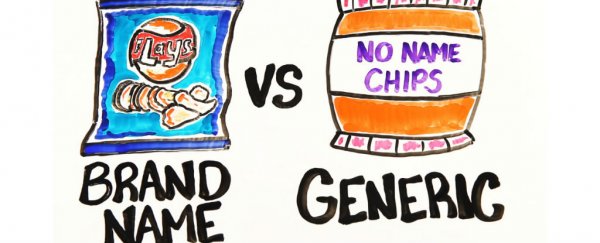
Generic vs brand name - that old chestnut. We've seen the blind taste-tests, been asked the question a thousand times by our local pharmacist, and heard dad go on and on about his amazing Aldi beans for years, but what does science say about this age-old battle of the brands (or no-brands, as the case may be)?
Most of us are happy to spend a little extra cash to ensure quality, but is that really what we're getting when we opt for the thing in the fancy packaging?
As the latest episode of AsapSCIENCE explains, you can actually figure all this out on your own, regardless of whether you're looking at things like foods, drugs, or cosmetics. Just take a look at the ingredients list.
The generic and brand name products might not be identical in their ingredient list and nutritional value information (many of them are), but comparing them will give you a pretty good indication of how similar they are. Not all of them will have comparable ingredients, but many 'big name' manufacturers often throw their leftover product into generic versions, so there's a good chance they will be.
Remember when Peter Pan brand peanut butter was recalled back in 2015 when it was found to be contaminated with Salmonella? You might not have noticed, but Walmart's 'great value' generic brand of peanut butter was also recalled due to contamination, because they both came from the same factory.
And here's the kicker - despite many brand name and generic versions containing much the same ingredients, studies have shown that brand name products are on average 30 percent more expensive.
Think you're making the more responsible choice by choosing the brand name drug over the generic version? The US Food and Drug Administration (FDA) requires all generic drugs to have the same active ingredient, strength, dosage form, and route of administration as the brand name product. And they don't make it easy - any new generic drug has to undergo a series of stringent regulatory tests established by the FDA to ensure strength, quality, purity, and potency.
That means when you buy the brand name version of a drug, you could be paying 30 percent extra (or sometimes more) for fancy packaging or slightly different inactive ingredients, such as starch, gelatin, colouring, or flavouring. Maybe you just paid for their advertising campaign.
And the fact that you're paying more for the same product doesn't just suck for your back account. As the boys at AsapSCIENCE explain, studies have found that people often stay on course with generic brand drugs for longer, due to their significantly lower cost.
It's natural for us to opt for the brand name version of things - as humans, we've been conditioned to trick ourselves into thinking that the thing in the fancy packaging simply tastes or works better.
The video above describes an experiment run with university students, where they were offered two different types of free coffee: one sitting on a silver tray with the milk and sugar in nice containers, and the other just came with styrofoam cups with haphazardly written labels.
As you might expect, the students overwhelmingly preferred the coffee on the silver tray, despite the fact that both were the exact same brew.
Just as the placebo effect has been shown to have a very real influence on people in medical situations, it really can affect your taste preferences too.
So, case closed, never buy brand name products again? Well, not necessarily, and in some situations - particularly when you're dealing with specialised medical conditions - brand name products can be your only real choice. Watch the AsapSCIENCE video above to find out why, and learn how to save those dollar bills to buy yourself something that's actually special.

